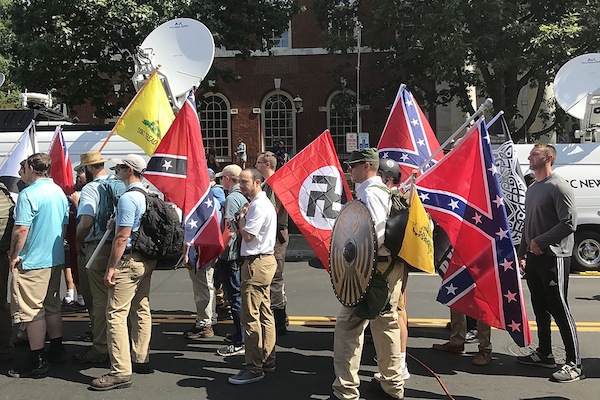President Trump’s comments regarding the Charlottesville violence revealed the yawning moral vacuum in the White House. Now is the time for rabbis to work tirelessly to bring peace, unity, and justice to all people in the United States.
By Itamar Haritan

Salem Pearce, a rabbinical student and senior organizer with T’ruah: The Rabbinic Call for Human Rights, remembers where she was when she first heard President Trump defend white supremacists. She was still in Charlottesville, recovering at a local café after supporting counter protesters alongside clergy of all faiths. Earlier she had watched people being carried away on stretchers after a white supremacist’s car rammed a group of protesters, murdering 32-year-old Heather Heyer.
Pearce, who joined T’ruah rabbis and many other clergy members in Charlottesville, recounted: “Someone shouted for the volume: the president appeared on screen. The man who never fails to display his monumental unfitness to lead said, ‘We condemn in the strongest possible terms this egregious display of hatred, bigotry and violence, on many sides. On many sides.’ Those of us in the room gave a collective shout of anger.”
Over the last week our rabbis have been asked numerous times by non-Jews if we were shocked by the racist violence in the streets of America in 2017. For many the answer is both yes and no. Recent public displays of bigotry did not occur spontaneously from thin air. Jews and other historical targets of hate may be outraged, but we aren’t surprised. The defenders of structural racism have been emboldened by Trump’s rhetoric and policies, and such a tragedy was only a matter of time. It is like the difference between someone dying after a long illness, where death is expected but is nonetheless jarring, versus someone dying unexpectedly.

President Trump’s comments regarding the Charlottesville violence revealed the yawning moral vacuum in the White House. Especially now, we believe that rabbis have a crucial role to play. Rabbis have dedicated their lives to studying Jewish law, remembering Jewish history and offering moral guidance. Now more than ever, rabbis must work tirelessly to bring peace, unity and justice to all people in the United States.
Rabbis and cantors look to Jewish texts and tradition to do that. On the morning that the violence in Charlottesville escalated, many of us were reading the Haftara (prophetic reading), the second in a series of consolations following Tisha B’av — the day Jews mark the destruction of the First and Second Temple. The prophet Isaiah channels divine words of strength and encouragement:
Listen to Me, you who pursue justice, You who seek the LORD: Look to the rock you were hewn from, To the quarry you were dug from. Look back to Abraham your father And to Sarah who brought you forth. For he was only one when I called him, But I blessed him and made him many. (Isaiah 51:1-2)
The text invites us to respond to tragedy by remembering our relationship with the Almighty, the promise that the Divine made to us, and the promise that we made to it. It is in moments of tragedy that it is most important to remember our true nature as beings made in the image of God. Rabbis throughout the ages have read this text when tragedy struck, turning horror and outrage into an opportunity to reconnect to our deepest beliefs. Rabbis are tasked with remembering the courage of previous generations, and offering that courage as a gift and an imperative to the challenges of the present day.

The Haftara is both a call to action and a call to remember. Both memory and the imperative to act motivated Rabbi Mordecai Leibling, a Philadelphia-based rabbi, to make the trip to Charlottesville: “It reminds me of the churches in Birmingham [in the Civil Rights Movement], that they couldn’t leave the churches because of the mobs outside… I think the Jewish community needs to understand it’s all part of a package for these folks. My parents were Holocaust survivors. My grandparents were killed by the Nazis. I didn’t feel I had a choice but to be here.”
T’ruah rabbis went to Charlottesville because they believe that rabbis can and must do their part to remind our communities about where we came from as a society and as human beings, and to remember our most deeply held values in order to face the moral challenges of our time.
T’ruah will be holding a webinar on confronting white supremacy and white nationalism on August 24. All rabbis or cantors are welcome to join.
Itamar Haritan is T’ruah’s Israel Program Manager.
